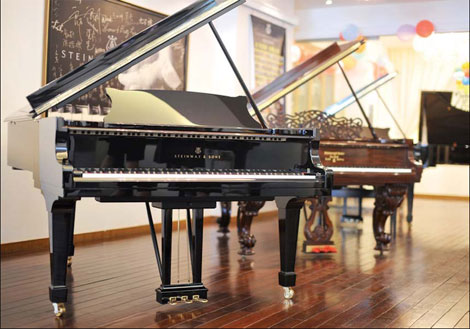Music to their ears

|
With growing income and changing cultural tastes, more Chinese families are looking for better quality, expensive pianos. Provided to China Daily |
Piano makers are tuning into Chinese market with customized options
When Zhang Zeyu turned 10, his parents knew exactly what to get the youngster who had just started piano lessons: a Steinway grand piano that cost 1.5 million yuan ($238,000, 179,000 euros).
People such as the Zhangs are helping fuel a burgeoning market in China for expensive pianos. For such buyers, even a respectable brand such as Yamaha isn't enough. Only the very best - and the most expensive - will do.
Steinway & Sons, a piano brand with a 159-year history that is now made in Germany and the United States, noticed the potential of the piano market in China 13 years ago; and the company set up an office in China in 1999.
"In those days, most of the sales of Steinway pianos were to institutions not quite as much to the private market," says John Patton, president of Steinway Piano Shanghai. "But it became clear to us that we would need to expand our distribution to private customers."
According to the China Musical Instrument Association, imports of pianos in 2011 grew by 32 percent compared to 2010. Although Japanese brands such as Yamaha and Kawai still dominate the market, more people are looking for top quality pianos.
"Chinese customers now have higher demands on pianos, and some of them even spend millions of yuan for expensive products from overseas, especially from Europe - the cradle of pianos," says Feng Yuankai, deputy secretary-general of the China Musical Instrument Association. The number of pianos imported from Germany last year grew by about 59 percent compared to 2010.
Steinway Piano (Shanghai) Co Ltd was set up in 2004, as was its distribution and dealer network throughout China. Steinway pianos are now on display and sold in 22 major cities in China, and two to three more markets are expected to be explored this year.
"Our sales volume has been growing in a very steady pace, on average 15 to 20 percent a year," Patton says.
Of all the Steinway pianos, standard ebony pianos are the most popular, whose grand piano prices range from 680,000 yuan to 1.6 million yuan. About 30 percent to 40 percent of its total sales are Crown Jewels, whose grand pianos sell for at least 1 million yuan, and whose sales number witnesses an annual growth of 20 to 30 percent. The rest are limited editions and one-of-a-kind Art Case pianos that are even more expensive.
The sales of another top piano brand, Italy's Fazioli, are experiencing the same trend, according to Lu Jian, general manager of the Beijing Branch of Parsons Music, the sole agent of Fazioli in China.
Lu says that when it first introduced this well-known brand - which sells for at least 1 million yuan each - to Beijing 10 years ago, it only sold a few that year. But the market has been rising for the past three years, with an annual growth rate of sales volume of about 20 percent.
According to Lu, income growth and changing cultural tastes caused changes in his client base.
"In the past, our clients were mainly restricted to professional schools and musicians who understood these brands. But now they cover hotels, companies, private clubs and families," he says.
Bluthner, a piano brand that is considered a national treasure of Germany, set up a company in southern Guangzhou in 2005 and has been working to expand its share in the Chinese market. Its sales volume in China grew by about 30 percent in 2011.
Fang Yang, general manager of Bluthner (China) Co Ltd, attributes the growth to the customers' brand awareness with pianos. Last year, it sold about 250 pianos, which were imported from Germany.
Today's Top News
- Xi calls for promoting volunteer spirit to serve national rejuvenation
- Xi chairs CPC meeting to review report on central discipline inspection
- Reunification will only make Taiwan better
- Outline of Xi's thought on strengthening military published
- Targeted action plan to unleash consumption momentum
- Separatist plans of Lai slammed































